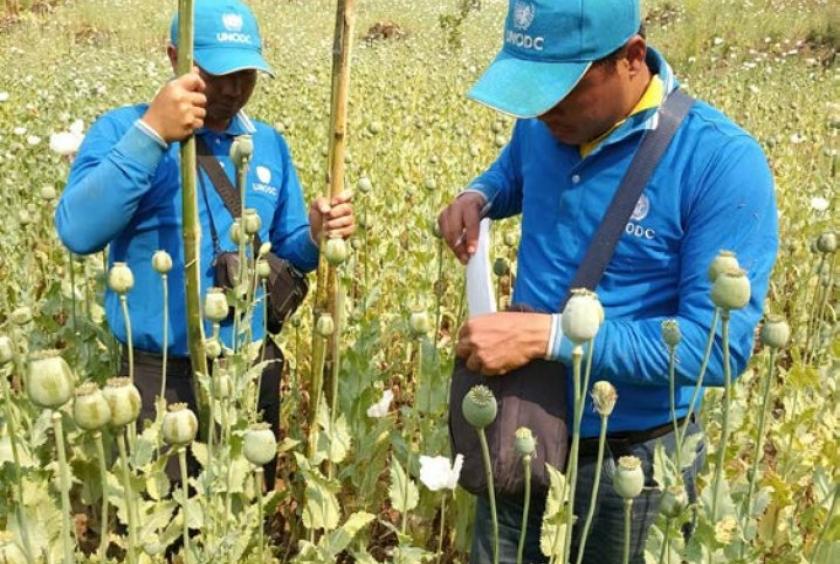
If we have to point out the most prominent and closest events related to drugs to Myanmar, we have to point to the opium wars that took place in neighboring China.
In the mid-19th century, there were two opium wars between China and Western powers, and China lost both wars.
In the period after 1800, European merchants were not satisfied with China's requirements for trade with China, and the British wanted to invade China but due to China's large population, opium was first traded to China, and opium-eaters became abundant in China.
Therefore, in 1839, in order to root out the abundance of opium in China, the Chinese prevented the opium trade, and the British government had also been informed to make to stop the merchants the importation of opium and that action would be taken if they were caught by the Chinese, but the British merchants did not stop the opium trade. The British declared war on China after the capture of British merchants by the China, and the first opium war lasted three years from August 1839 to September 1842.
The British won in the first opium war and continued to trade opium. They received the principles of free trade, five trading ports, US$21 million as war reparations from Mianning King of China and Hong Kong, part of mainland China, was included as a British colony.
The second opium war lasted four years from 1856 to 1860, and the Chinese lost the war.
The second opium war was fought first by the British, supported by 11 European countries and the United States, and later joined by the French.
The reason for the outbreak of the war was that the British were legally operating the opium trade in the ports that were given to them due to the defeat of the first opium war, so the Chinese government tried to control and ban the opium trade in China. The war was declared on the pretext that the China started violating the bilateral agreement due to the arrest of opium trafficking by the China.
China has suffered the bad consequences of drugs since old days. Drug abuse is still a challenge to public health and social affairs for the world nations.
Due to the opium wars and cultural setting, China has strict legislation and punishment concerning drugs.
China is one of the countries that imposed the toughest law for combating drugs.
If one smuggles heroin, methamphetamine, or cocaine above 50 grams, one can be sentenced to death penalty.
Among the drugs spread in China, majority is from foreign countries.
In 2022, nearly 12 tonnes of heroin, methamphetamine and ketamine were seized and among them, over 92 percent was imported.
Besides, 92 percent of the imported heroin is from Golden Triangle area in the border of Myanmar, Laos and Thailand.
Other data also pointed out that Shan State in Myanmar-China border also produced most of heroin.
Online gambling and online scams based in border areas are the consequences of increase of drugs production, and armed groups. As their influence in the area bigger, there is less in rule of law and smuggling increases.
In practical, online gambling and online scams will affect China even if there are crackdown on these illegal works, other illegal businesses will emerge.
■ How SAC will handle to solve the civil war and other conflicts
It’s been 3 years that military took power in February 1, 2021 and formed State Administration Council (SAC).
One of the factors that have led to the growth of current conflicts is the fact that the SAC has not been able to successfully transfer power back to the civilian government in a stable manner within a year of taking over power.
It has already been five times that SAC has extended the state of emergency period by 6 months.
As the armed conflicts throughout Myanmar have intensified, the SAC have extended the state of emergency for numerous times by claiming that the current situation of the country is not a normal situation.
Due to the intensifying armed conflicts throughout Myanmar, the Military Service Law (military conscription law that was drafted in 2010) was also recently activated by the SAC.
There have also been criticisms that the spread of widespread armed conflicts is due to the failed implementation of the ASEAN Way (5 Point Consensus).
In the current situation, in order to ease the conflicts, it must be said that the SAC should work towards reducing international pressures through ASEAN and return to the path of democracy. Otherwise, it will inevitably be dominated by superpower countries.
In addition, it must be said that during the three-year period of SAC, there has been no political solution, which has led to a wider spread of armed conflicts.
Political analysts are urging that the best path would be to discuss with the opposition by accepting differing viewpoints, to open the way for dialogue with international community, and to implement the transfer power to the civilian government as promised by holding the general election as soon as possible.
During the previous instance in 1988 when the military took over power, elections for democracy could only be held in 2010. As a result, people had to wait over two decades for the emergence of a civilian government.
Now, it is crucial for Myanmar to quickly get back on the road to democracy.
In order to overcome the current escalating conflicts, the SAC will inevitably need to quickly achieve internal stability and successfully transfer power to a civilian government by holding an election.
To be continued.










